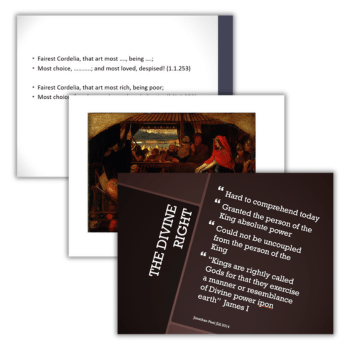Edmund from King Lear – Key quotes to understand the play

Helen Mears examines the motivations, foibles and ill-fated decisions of King Lear’s duplicitous central antagonist…

- by Helen Mears
- English teacher and British Shakespeare Association education committee member

Who is Edmund from King Lear?
Edmund from King Lear is the illegitimate son of the Earl of Gloucester. Resentful of his position and envious of his legitimate half-brother, Edgar, he’s a scheming villain in the mode of Aaron from Titus Andronicus and Iago in Othello and manipulates many of the characters in the play.
He’s also frequently alone on stage, allowing him to share his thoughts and schemes with the audience.
Edmund from King Lear – quotes explained
“… Why bastard? wherefore base?
When my dimensions are as well compact,
My mind as generous, and my shape as true,
As honest madam’s issue?’
(Act 1, Scene 2, lines 6-9)
In his first speech that addresses the audience, Edmund bemoans his status as a bastard and states that illegitimate offspring are as good as their more respected legitimate peers.
In Early Modern drama, writers generally coded bastards as villains, so the audience would expect Edmund to be villainous. Shakespeare has littered this soliloquy with the hard, plosive ‘b’ sound. This becomes a feature of Edmund’s speech and reflects his anger that people exclude bastard offspring from the social order.
Faux innocence
“It is his hand, my lord; but I hope his heart is not in the contents.”
(Act 1, Scene 2, line 69)
We see Edmund scheming from his very first appearance in the play, as he embarks on a plot against his half-brother, Edgar. This sees him forge a letter stating that Edgar is plotting against their father.
Shakespeare wrote King Lear shortly after Othello. Their villains use similar techniques of faux innocence, hoping to influence their respective victims.
“To both these sisters have I sworn my love;
Each jealous of the other, as the stung
Are of the adder.”
(Act 5, Scene 5, 55-58)
As well as scheming against his family, Edmund also plays Lear’s eldest daughters, Goneril and Regan, against each other. He leads each of them to believe he loves them, causing them to turn on each other and resulting in their eventual deaths.
Alongside Edmund, Goneril and Regan represent the play’s theme of children turning against their fathers.
Edgar and Cordelia are the children who stay loyal, but they’re not rewarded for it, giving the play its infamously bleak ending – one that was rewritten to end on a happier note between the 17th and 19th centuries.
Trending
More Edmund quotes explored
‘Back I do toss those treasons to thy head;
With this hell-hated lie overwhelm thy heat;
Which […] this sword of mine shall give them instant way
Where they shall rest for ever.’
(Act 5, Scene 3, lines 143.145)
The disguised Edgar challenges Edmund to a duel and accuses him of being ‘False to thy gods, thy brother, and thy father.’ Edmund hubristically responds that the claims are treasonous, that he will kill this unknown knight and send both him and his ‘false’ accusations to Hell.
“The wheel has come full circle.”
(Act 5, Scene 3, line 172)
Having mortally wounded Edmund, Edgar reveals his identity, prompting Edmund to refer to the Wheel of Fortune. It was believed that fate or God could spin the wheel at any time to change someone’s position.
Having forcibly tried to move himself from the bottom of the social order through manipulation, Edmund realises that the wheel has turned back to its original position – restoring the legitimate, honest Edgar to his high position and leaving Edmund languishing at the bottom.
‘Quickly send […] to the castle; For my write
Is on the life of Lear and Cordelia.’
(Act 5, Scene 3, lines 212-213)
Approaching death and accepting of his fate, Edmund finally shows some morality at the end of the play. He has ordered Cordelia to be killed, but tries to save her by telling Edgar and Albany to hurry back to the castle.
They arrive too late. Cordelia is already dead, and the play ends with the surviving members of the younger generation reflecting on the fate and wisdom of the older generation.
Helen Mears is an English teacher who sits on the education committee of the British Shakespeare Association. Follow her on Twitter at @shakesmears. Browse more resources for Shakespeare Week.










